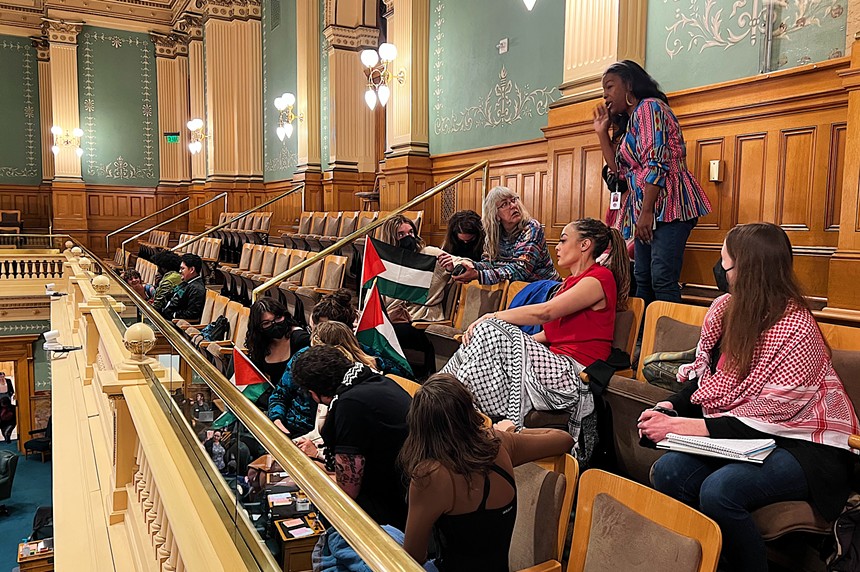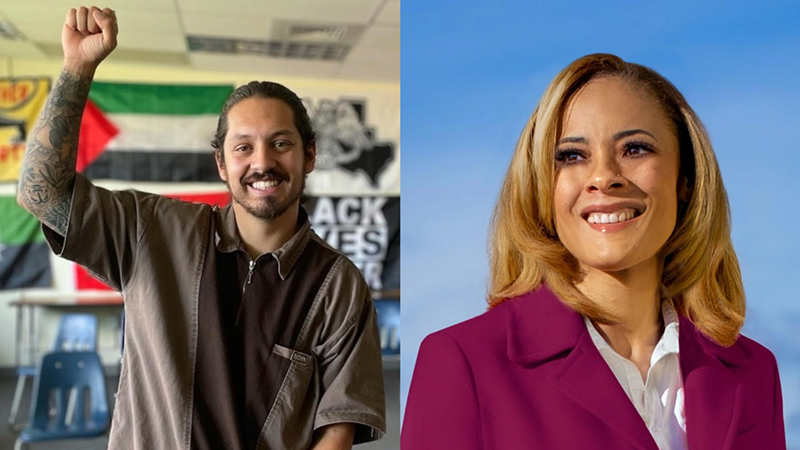Epps and Hernández were both defeated in their Democratic primary races on Tuesday, June 25. Epps lost to challenger Sean Camacho in House District 6, 61 percent to 39 percent, and Hernández lost to Cecelia Espenoza in House District 4, 53 percent to 47 percent, according to the latest ballot counts as of Friday, June 28.
They were among just five incumbent state representatives to face primary challengers this year, and the only two within Denver. Of the five challenged representatives, only one other also lost their seat: Representative Julia Marvin of District 31.
Epps's and Hernández's pro-Palestine displays made headlines throughout the past year, from Epps leaving the House floor to join pro-Palestine protesters during the special session, to Hernández putting a Palestinian flag on his desk and attending a pro-Palestine rally the day Hamas attacked Israel. Advocates on both sides of the conflict agree this likely contributed to the results of the primary election — though the reason why is up for debate.
Denver Democratic Socialists of America says Epps's and Hernández's vocal support for Palestine made them a target for establishment groups to rally against, blaming the defeat on corporate influence.
"The billionaire class poured historic sums of money into races like Tim and Elisabeth’s because they are deeply afraid of the threat our movement poses to their system of war profiteering and ethnic cleansing," the group says in a statement. "Several leftwing candidates who didn’t take a stand on Palestinian liberation also lost, but it’s clear that the billionaires — particularly Republican billionaires — were motivated to spend more against us because of Palestine and very low voter turnout."
Groups with hidden donors spent hundreds of thousands of dollars against Epps and Hernández in the primary. And just days before the election, a group tied to millionaire Kent Thiry dropped over $1 million into Colorado legislative primaries, including $150,000 supporting Hernández's opponent and $100,000 supporting Epps's opponent.
But Stop Antisemitism Colorado, whose action fund supported Epps's and Hernández's challengers, attributed the legislators' losses to them "exploiting the power of their offices to spread propaganda and disinformation" about the Israeli-Palestinian conflict.
"Representatives Epps and Hernández not only alienated mainstream voters, they motivated the Jewish community to show up and make our voices heard," says Stefanie Clarke, co-founder of Stop Antisemitism Colorado. "Their dangerous and divisive rhetoric took attention away from the real problems facing Colorado voters, the very problems they were elected to solve. This election was a referendum on the far left of the Democratic party and their hyper-focus on delegitimizing the state of Israel and demonizing Jews for a war being waged on the other side of the world."
The Colorado Democratic Party is deeply divided on the issue. The party's Central Committee voted to reject a ceasefire resolution on Monday, July 1, with 55 percent of members opposing the resolution, 40 percent approving it and the rest abstaining.
The resolution called for an immediate ceasefire and the release of all hostages, as well as condemning "the terrorist attacks against Israeli civilians by Hamas," "the disproportionate military response by Israel" and "the continued construction of settlements and the settler violence against Palestinians." Opponents called the resolution divisive and detrimental to fostering collaboration among Colorado Democrats working on local issues.
Epps and Hernández are not the only state legislators to call for a ceasefire or to express support for Palestine. But their actions while doing so have at times put them at odds with their colleagues.
Epps was reprimanded for disrupting proceedings when she joined the pro-Palestine protest and shouted over a Jewish representative who she says cursed at her for talking about Gazan children on the floor. Legislators on both sides of the aisle criticized Hernández for attending the pro-Palestine protest after the Hamas attack, leading to Republican legislators calling for him to be expelled.
Epps and Hernández racked up numerous endorsements from progressive groups such as labor unions, reproductive rights organizations and gun violence prevention associations, and Hernández received support from more than two dozen of his colleagues. But Epps's challenger, Camacho, was also backed by many sitting elected officials, including at least 22 of her fellow state legislators. The Capitol's highest-ranking legislator, Senate President Steve Fenberg, endorsed both Epps's and Hernández's challengers, as well.

Representative Elisabeth Epps (in red) sits with a group of pro-Palestine protesters during the last day of the special session.
Hannah Metzger
"This is about Palestine. Period," Epps responded in a post on X. "I support a ceasefire. Vocally. Polis and [Representative Shannon Bird, who also endorsed Camacho] do not."
Epps repeatedly discussed the Israeli-Palestinian conflict in posts promoting her candidacy leading up to the election, saying, "It feels great to be able to represent a district where so many people are against genocide," on June 24 and, "I’m knocking doors all this blazing hot day [because] I want my neighbors to have the opportunity to vote for someone who works hard for Colorado and opposes genocide," on June 22.
Hernández says the issue is of great concern to Denver voters, arguing that his stance reflects that of his community.
"I've knocked thousands of doors. I talk about this issue to people who are coming home from their second job to feed their kids, and the only thing they want to talk about is Palestine," Hernández said during an interview with Westword a week before the election. "There are a whole lot of people in our neighborhood who deeply understand and deeply stand with the call for peace right now. ... It is not unique to me and Elisabeth standing up for this issue, nor is it unique for me to stand up for this issue in this community."
Hernández was already a controversial figure before a vacancy committee appointed him to the Statehouse last August. He made headlines for inspiring student protests at North High School when he lost his teaching job. Upon the news of his appointment, he attracted ire from Fox News pundits over his previous calls for a “forceful cultural revolution” against white supremacy.
While Hernández's storm quieted once he entered office, Epps regularly found herself the subject of Capitol conflict. She made waves by suing House leadership for allegedly violating open-meetings law, and was often one of few Democrats to vote against party-sponsored legislation; for example, she was the only Democrat who opposed a bill to study the impacts of systemic racism in Colorado, and she filibustered for three hours against a bill to make indecent exposure toward minors a felony.
Epps has also been criticized for the manner in which she speaks to those who disagree with her political stances, from her legislative colleagues to social media users advocating to remove the conservation easement from Park Hill Golf Course. Epps has called these criticisms "tone policing" and racially targeted. After the special session conflict, Epps was removed from her position on the House Judiciary Committee, with Speaker Julie McCluskie citing a lack of "respect of colleagues" and "ability to collaborate."
McCluskie also endorsed Epps's opponent in the primary. "I thank [Epps and Hernández] for their service to their communities and look forward to working with their successors to continue our efforts in helping people realize their own Colorado dreams," McCluskie says.
Besides their stances on Palestine, Epps and Hernández led policy efforts unpopular with the governor and moderate party members, including banning so-called assault weapons, allowing overdose prevention centers and increasing protections for employees.
The former two bills failed to get enough votes last session, though Hernández told Westword he had already filed a bill title to bring back the assault weapons ban next year. The latter measure concerning employee protections made it all the way to the governor's desk, where it was vetoed. The bill would have shielded workers from punishment for refusing to participate in employer-sponsored meetings about religious or political matters. In his veto letter, Polis said he worried the definitions of "religious or political matters" were too broad.
Overall, the primary election had mixed results for progressive candidates. Moderate candidates backed by Polis and business groups won in Senate District 19 in Jefferson County and House District 36 in Adams and Arapahoe counties; but more liberal candidates took home victory in House District 52 in Larimer County and Senate District 28 in Adams and Arapahoe counties.
“I view it as Colorado and candidates having a conversation with each other about what direction they want the state to move in," says Shad Murib, chair of the Colorado Democratic Party. “The Democratic Party is having a great conversation between progressives and moderates about what is the path forward."
The Colorado Democratic Party did not endorse candidates in its party primaries, unlike the Colorado Republican Party, which saw fourteen of its eighteen endorsed candidates lose. Murib says rather than showing voter preference between Democratic progressive and moderate candidates, the primary results are “a real rebuke of the Republican platform.”
However, the defeat of top progressives Epps and Hernández provides some optimism for Republican candidates who interpret the results as voters shifting toward the right — even though Epps's and Hernández's Denver districts are major Democratic strongholds.
“It looks like House District 6 is ready for a change," says Kyle Witter, the Republican candidate for Epps's House District 6, who will face Camacho during the November election. "I am excited to be the truly moderate choice for House District 6 that will represent the people over the political establishment.”
Meanwhile, Camacho is already setting his sights on policy: "The people of House District 6 sent a powerful message: They want results from the State Capitol," he says. "With Democrats controlling both legislative chambers and the governor’s mansion, we need lower inflation, housing that’s affordable, strong schools, guaranteed reproductive freedom, protections for our environment, and finally, a long overdue ban on assault weapons."
Progressives are ready to continue the fight, too. Even without their lead supporters in the legislature, Denver DSA says the pro-Palestine movement will continue to be alive and well. "No election could ever shake our commitment to the liberation of Palestine," the group says. And Epps feels the same way.
"From Denver to Palestine, on we press," Epps said in an X post in response to the primary results.












